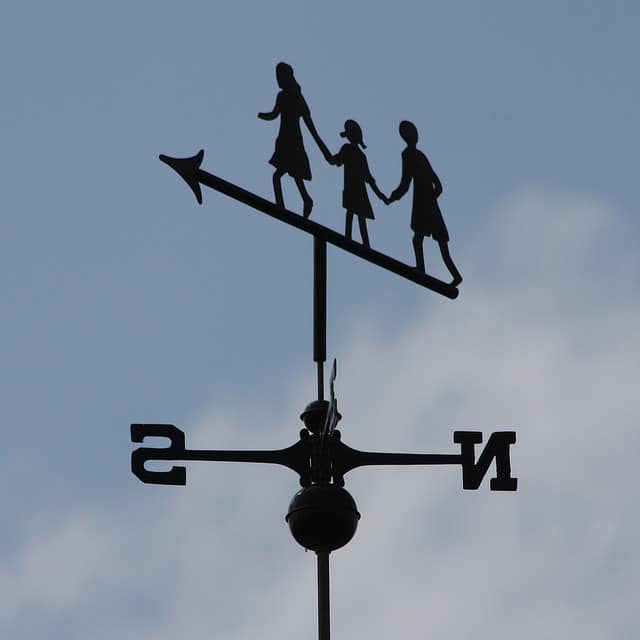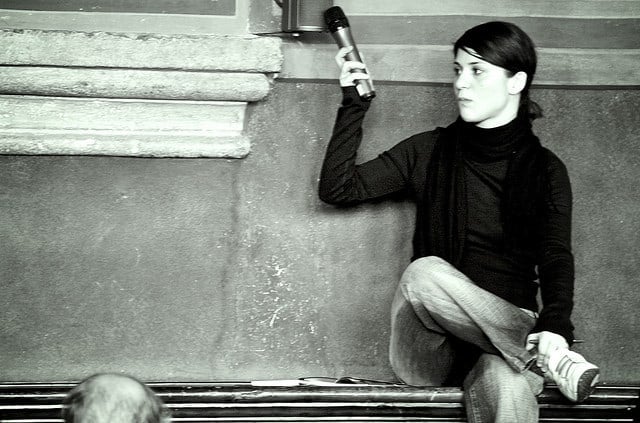
Sacraments are like weather vanes; in the sacraments we make invisible things visible.
I held the mic. That’s about it. I had been asked to serve as an acolyte for the diaconate ordination of eight Jesuits here in Madrid. During an ordination liturgy the presiding bishop moves around more than usual — sit, stand, kneel, from one chair to another and back again. It’s like a byzantine improv game and mic-stands don’t walk. So, that was my job. I was a big bearded mobile mic-stand all dressed in white. I held the mic so that everyone else could hear what the bishop was saying and pray along in a language I still struggle to understand.
I held the mic and that was enough for me.
You get a pretty good view of the action when you’re the mic-man. You can look over the bishop’s shoulder and read along if you like. You can scan the congregation and see who’s paying attention or who’s sleeping, who wishes this place had better air-conditioning or who’s crying. You can wonder why they’re crying. Or, I suppose, you can watch those being ordained.
The ordination rite includes lots of promises. The deacons-to-be kneel and promise and kneel and promise again. It’s a bit like a nervous parent giving their kids the car keys for the first time. They responded to each inquiry like every kid does, “Yes, yes, yes, I promise, I promise, I promise.” Our adolescent wisdom tells us that in these circumstances it’s best not to say too much; just say ‘yes’ and get on with it. Eventually, instead of car keys, they receive the book of the gospels. In both cases, car keys or holy orders, they receive an enormous privilege.
And then we all watched the new deacons get dressed. This is not something you often do in public, watch another person getting dressed. That makes us uncomfortable, so we use another word — vested. I watched them get vested, in sparkly new vestments, freshly pressed and golden. And, in spite of my cynical self, I couldn’t help but notice something happening, something both very old and surprisingly new, something simple and sacred, something we call a sacrament.
***
Sacraments are like weather vanes; in the sacraments we make invisible things visible.
Why did I want to be a priest? I didn’t. But, in ways I don’t fully understand and can’t always articulate, things changed as I said yes to my vocation as a Jesuit. At some point I came to realize that while I don’t have all the answers (even if I sometimes foolishly think I do) I know enough to want only what God wants for me. I began to trust that this is what I’m asked to do by the Society of Jesus and, in turn, the Church. I suppose I also came to appreciate that what we all want most profoundly is to give ourselves in love and the Jesuits I knew lived their priesthood in this way, in loving service. I never imagined myself a Jesuit, nor a priest, yet somehow, in time, something I couldn’t see became visible, something I couldn’t imagine became real.
***
After the mass, in the cool evening air of the parish plaza I watched another father vesting another servant. She was maybe three or four years old and hesitant — I don’t want to wear the coat, Papa. But he was insistent, gentle, but insistent — Ay mija, but it’s cold tonight and you’ll need it. Her hesitance softened and she seemed to enjoy his embrace as he knelt behind her, wrapped his arms around her and buttoned the coat, thoroughly, carefully, one toggle at a time.
As he stood up again she leaned back against his legs. Looking up from her freshly toggled coat, she caught me watching her vestiture. I smiled. She threw her arms wide open and beamed a joyful grin of pride, as if to say, Look at my coat! Isn’t it lovely! Her joy had nothing to do with my liturgical celebrity status (even if I was the best mic-stand ever) but it did have something to do with recognition. She was overjoyed because an invisible thing — the love and care of her father — had been made visible in her well-buttoned coat.
Hers was the joy of the sacraments. Mine was the joy of witness.
***
To watch these companions of mine be ordained was a beautiful thing; something I’ve known to be true (their capacity to serve, to proclaim, to comfort) was recognized publicly; something invisible was made visible. They are generous men. This was not the first time they had lain humble before the saints, not the first time they held someone’s hand in prayer and promise, not the first time they offered themselves in service. And it will not be the last. Still there are other invisible graces that they can and must make visible in our Church.
If the sacraments are about making invisible things visible, then so too unthinkable things thinkable, unknowable things knowable, and impossible things possible. In any Christian community worthy of the name the impossible to imagine must become the rock of faith; the mute given voice, the naked clothed, the hungry fed. As baptized members of the body of Christ we are all called to be who God is in the world. Take that idea seriously, that is to say, actually believe it, and it will change everything.
And what about that little girl? Where will she find a place of leadership and ministry? She stands with many women in our Church waiting for and worthy of recognition, deserving of more meaningful authority. That ordained ministry has been a prerequisite for administrative responsibility in the Church has both corrupted our sense of the priesthood (confusing sacramental service for power and prestige) and excluded women from positions of ecclesial leadership. To see the treasure of their talent, however, we’d be fools to think that a generous grace is not already given them. And yet, if we’re slow to recognize this grace our daughters may grow cold; their joyful enthusiasm may fade away.
Invisible things beg for recognition and we ought to rejoice in their revelation. There is more grace begging for visibility and more faithful servants ready for responsibility. There are more coats and more toggles. There are more voices in need of a microphone.
The work of the sacraments is this: to make visible the grace already given, to make possible the promise already present. We hold the mic, we give voice to silent prayers, we lay our hands on one another in blessing and we vest one another in love. The grace is God’s to give and the promise fulfilled in mercy. As I imagine my own ordination, still a few years off, I hope always to remember my vocation as a big bearded mic-stand and I hope never to forget the joy on that little girl’s face after her father’s love was finally made visible in something as simple as a well buttoned coat.
– // –


